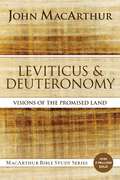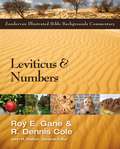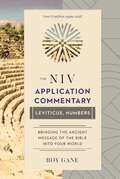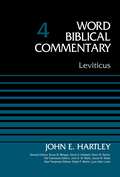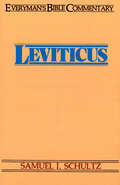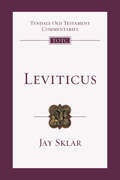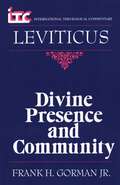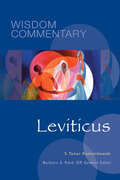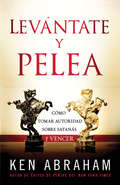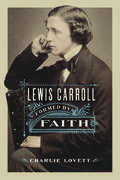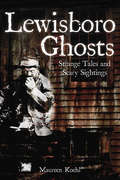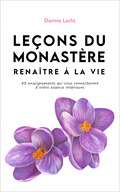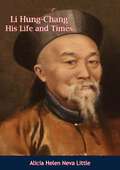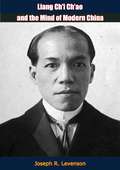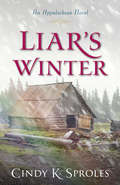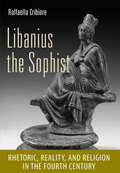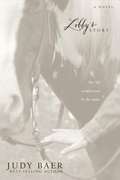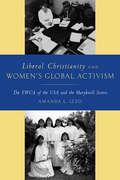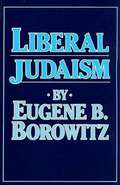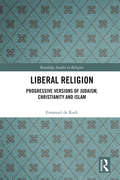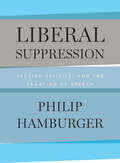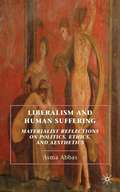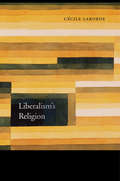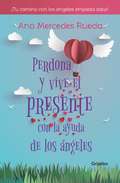- Table View
- List View
Leviticus and Deuteronomy: Visions of the Promised Land (MacArthur Bible Studies)
by John F. MacArthurPastor John MacArthur will take you through the books of Leviticus and Deuteronomy, passage by passage, so that you can better understand the author's message, the cultural context, and the law that God gave to his people.The Israelites' exodus from Egypt marked the end of a period of oppression in their history. It also marked the beginning of God fulfilling His covenantal promise to a man named Abraham, that his descendants would not only reside in the Promised Land but would also multiply and become a great nation. So, at various times, God gave the Israelites a body of legislation—known as the law—to instruct them on how to live properly as the people of God. By this, they were to be distinct from all other nations on the earth.In the twelve studies within, John MacArthur explores these laws that God gave to His people as recorded in the books of Leviticus and Deuteronomy. As you work through this study, you will discover that obedience and the pursuit of personal holiness are always based on the character of God. Because of who He is, His people are to be holy.The MacArthur Bible Studies provide intriguing examinations of the whole of Scripture. Each guide incorporates extensive commentary, detailed observations on overriding themes, and probing questions to help you study the Word of God with guidance from John MacArthur.—ABOUT THE SERIES—The MacArthur Bible Study series is designed to help you study the Word of God with guidance from widely respected pastor and author John MacArthur. Each guide provides intriguing examinations of the whole of Scripture by examining its parts and incorporates:Extensive, but straight-forward commentary on the text.Detailed observations on overriding themes, timelines, history, and context.Word and phrase studies to help you unlock the broader meaning and apply it to your life.Probing, interactive questions with plenty of space to write down your response and thoughts.
Leviticus and Numbers
by John H. Walton Roy Gane R. Dennis ColeMany today find the Old Testament a closed book. The cultural issues seem insurmountable and we are easily baffled by that which seems obscure. Furthermore, without knowledge of the ancient culture we can easily impose our own culture on the text, potentially distorting it. This series invites you to enter the Old Testament with a company of guides, experts that will give new insights into these cherished writings. Features include • Over 2000 photographs, drawings, maps, diagrams and charts provide a visual feast that breathes fresh life into the text. • Passage-by-passage commentary presents archaeological findings, historical explanations, geographic insights, notes on manners and customs, and more. • Analysis into the literature of the ancient Near East will open your eyes to new depths of understanding both familiar and unfamiliar passages. • Written by an international team of 30 specialists, all top scholars in background studies.
Leviticus, Numbers (The NIV Application Commentary)
by Roy GaneThe NIV Application Commentary helps you communicate and apply biblical text effectively in today's context.To bring the ancient messages of the Bible into today's world, each passage is treated in three sections:Original Meaning. Concise exegesis to help readers understand the original meaning of the biblical text in its historical, literary, and cultural context.Bridging Contexts. A bridge between the world of the Bible and the world of today, built by discerning what is timeless in the timely pages of the Bible.Contemporary Significance. This section identifies comparable situations to those faced in the Bible and explores relevant application of the biblical messages. The author alerts the readers of problems they may encounter when seeking to apply the passage and helps them think through the issues involved.This unique, award-winning commentary is the ideal resource for today's preachers, teachers, and serious students of the Bible, giving them the tools, ideas, and insights they need to communicate God's Word with the same powerful impact it had when it was first written.
Leviticus, Volume 4 (Word Biblical Commentary #4)
by Bruce M. Metzger Ralph P. Martin Lynn Allan Losie David Allen Hubbard Glenn W. Barker John D. Watts James W. Watts Dr John HartleyThe Word Biblical Commentary delivers the best in biblical scholarship, from the leading scholars of our day who share a commitment to Scripture as divine revelation. This series emphasizes a thorough analysis of textual, linguistic, structural, and theological evidence. The result is judicious and balanced insight into the meanings of the text in the framework of biblical theology. These widely acclaimed commentaries serve as exceptional resources for the professional theologian and instructor, the seminary or university student, the working minister, and everyone concerned with building theological understanding from a solid base of biblical scholarship. <P><P>Overview of Commentary Organization Introduction—covers issues pertaining to the whole book, including context, date, authorship, composition, interpretive issues, purpose, and theology.Each section of the commentary includes:Pericope Bibliography—a helpful resource containing the most important works that pertain to each particular pericope. Translation—the author’s own translation of the biblical text, reflecting the end result of exegesis and attending to Hebrew and Greek idiomatic usage of words, phrases, and tenses, yet in reasonably good English.Notes—the author’s notes to the translation that address any textual variants, grammatical forms, syntactical constructions, basic meanings of words, and problems of translation. <P>Form/Structure/Setting—a discussion of redaction, genre, sources, and tradition as they concern the origin of the pericope, its canonical form, and its relation to the biblical and extra-biblical contexts in order to illuminate the structure and character of the pericope. Rhetorical or compositional features important to understanding the passage are also introduced here.Comment—verse-by-verse interpretation of the text and dialogue with other interpreters, engaging with current opinion and scholarly research.Explanation—brings together all the results of the discussion in previous sections to expose the meaning and intention of the text at several levels: (1) within the context of the book itself; (2) its meaning in the OT or NT; (3) its place in the entire canon; (4) theological relevance to broader OT or NT issues.General Bibliography—occurring at the end of each volume, this extensive bibliography contains all sources used anywhere in the commentary.
Leviticus- Everyman's Bible Commentary (Everyman's Bible Commentaries)
by Samuel SchultzHave you ever resolved to read through the entire Bible, only to abandon your resolution when you reached the long, detailed passages of Leviticus? Or wondered why God included all those lists of ceremonial laws and instructions in His inspired Word? What can those dictates possibly mean to Christians today? Schultz's clear, step-by-step study of this Old Testament book will convince you that, among those complicated instructions to the people of Israel, God does have a message for you. Take a closer look at those rituals and rules. The study of Leviticus can give you a deeper, richer understanding of the holiness of God and His desire and provision for fellowship with His people. Nothing could be more relevant to your life.
Leviticus- Everyman's Bible Commentary (Everyman's Bible Commentaries)
by Samuel SchultzHave you ever resolved to read through the entire Bible, only to abandon your resolution when you reached the long, detailed passages of Leviticus? Or wondered why God included all those lists of ceremonial laws and instructions in His inspired Word? What can those dictates possibly mean to Christians today? Schultz's clear, step-by-step study of this Old Testament book will convince you that, among those complicated instructions to the people of Israel, God does have a message for you. Take a closer look at those rituals and rules. The study of Leviticus can give you a deeper, richer understanding of the holiness of God and His desire and provision for fellowship with His people. Nothing could be more relevant to your life.
Leviticus: An Introduction and Commentary (Tyndale Old Testament Commentaries)
by Jay SklarPreaching's Preacher's Guide to the Best Bible Reference for 2014 (Old Testament Commentaries) Levitical rules and regulations can at first appear irrelevant to contemporary Christians--but they provide important Old Testament background for understanding large portions of the New Testament. Leviticus describes a point in human history when God came and dwelt in the midst of the ancient Israelites and taught them what their purpose in life really was. Jay Sklar's commentary makes clear what it is that the Lord said to them and, in so doing, makes clear what he says to us today.
Leviticus: Divine Presence and Community
by Frank H. Gorman Jr.This commentary by Frank Gorman shows how Leviticus, though focusing largely on matters associated with the Levitical priesthood, is also important to laypeople. Gorman addresses the question of Israelite identity and what it means to be people of God. Through a careful application of exegesis and exposition, he shows that Leviticus is, foremost, a call to holiness, a weaving together of ritual and ethical issues to provide the community with a means for enacting and actualizing covenant relationship.
Leviticus: Wisdom Commentary, Volume 3
by S. Tamar Kamionkowski Lauress Wilkins Lawrence and Barbara E. ReidThe book of Leviticus provides two different theologies related to God’s presence within ancient Israel. Leviticus 1–16 was written by an elite caste of priests (P), and Leviticus 17–26 (H) was added to the book to “democratize” access to God. While the Priestly work has hardly inspired lay readers, the Holiness Writings provide some of the most inspiring and well-known verses from the Bible. <P><P> This volume shows how gender dynamics shift between the static worldview of P and the dynamic approach of H and that, ironically, as holiness expands from the priests to the people, from the temple to the land of Israel, gender behaviors become more highly regulated. This complicates associations between power and gender dynamics and opens the door to questions about the relationships between power, gender, and theological perspectives.
Levántate y Pelea: Cómo tomar autoridad sobre Satanás y vencer
by Ken AbrahamLas armas que usted necesita en la guerra contra Satanás A la mayoría de nosotros no nos gusta pelear con el diablo. Eso es inteligente. Solo un tonto buscaría enfrentarse a un ser sobrenatural demoniaco. Lamentablemente, ese intruso maligno ha venido buscándote. El no pelea justamente, ni tampoco espera una invitación. Levántate y pelea, te prepara para cada batalla. Presentado en un estilo dinámico y accesible, es el recurso perfecto para reconocer y enfrentar los ataques demoniacos, las maldiciones generacionales y las fortalezas que vienen contra ti, de modo que puedas: · Reconocer las huellas de Satanás en tu vida, · Identificar cómo el enemigo trata de minar tu relación con Dios · Proteger tu vida, tu familia y amigos de los ataques · Derrotar a Satanás con el poder del Espíritu Santo No tienes que soportar más las mentiras de Satanás. ¡En ti está el poder para levantarte y pelear!
Lewis Carroll: Formed by Faith
by Charlie LovettFor Lewis Carroll, a deacon in the Church of England, faith in Christ and belief in a loving God stood at the core of his being, but little has been written about what the church or faith meant to the celebrated author of the Alice books. With Lewis Carroll: Formed by Faith, Charlie Lovett provides the first in-depth study of the religious life of the famous author, whose real name was Charles Lutwidge Dodgson.By examining Dodgson’s religious education and core beliefs, this book shows how a deep Christian faith undergirded and guided every part of his life and work, from his relationships with children to his renowned writings, his work on logic, even his hobbies of photography and theatre going. The book includes a detailed account of the career of Dodgson’s father—an important figure in the Anglican church and a key influence on his son.Family records give insight into Charles’s early education, and newly discovered manuscript materials paint a full picture of his religious education at Richmond and Rugby Schools. Lovett finds previously unknown influences in Dodgson’s life, analyzes his habits of preaching and prayer, explores his training for confirmation and ordination, analyzes his reasons for eschewing the priesthood, and concludes with an account of his death and funeral and his logically constructed theology of the afterlife. The book makes use of previously untapped sources and highlights new material, including a previously unknown sermon by Dodgson, the first ever discovered. The result is a major contribution offering new perspectives on this creator of fantastical fiction and the spiritual bedrock that informed his life and imagination.
Lewisboro Ghosts: Strange Tales and Scary Sightings (Haunted America)
by Maureen KoehlOn the easternmost edge of Westchester County, among the quiet communities nestled against the Connecticut state line, memories of eerie incidents and haunted happenings flow through the generations like the currents of the nearby Hudson River. The old-timers of South Salem and Waccabuc still recall the legendary"Leather Man," an itinerant vagabond who rambled mysteriously through the region in the late 1800s. Over in Goldens Bridge they whisper of "the Christmas Soldier," an apparition of a Revolutionary-era Patriot who stalks the Highway 22 corridor. And beneath Long Pond Mountain the locals listen attentively for the "Wail of the Wind," the sorrowful moan attributed to two ghostly parents lamenting their son's drowning. Read Maureen Koehl's Lewisboro Ghosts to discover the spooky stories and supernatural sightings that linger in this tucked-away corner of the lower Hudson Valley.
Leçons du Monastère: Renaître à la vie - 33 enseignements qui vous connecteront à votre essence intérieure
by Davinia LachtDans Leçons du monastère, vous trouverez 33 enseignements clés pour réintégrer votre centre de tranquillité et vivre le quotidien dans la paix et l’harmonie. À travers des exemples pratiques et des expériences de l’auteure, vous découvrirez que la sphère spirituelle englobe tous les aspects de votre vie et que vous êtes prêt à vous ouvrir à la voie de l’amour, ici et maintenant. Guérissez vos relations, profitez du quotidien et laissez-vous guider par les voix du silence. Ces pages sont une invitation à découvrir votre rôle essentiel dans ce monde et à comprendre que la seule chose qui puisse vous faire ressentir la plénitude est justement de jouer ce rôle. La vie est simple et c’est votre droit de naissance d’être heureux, en honorant votre relation avec les autres et en vivant le moment présent de façon inconditionnelle. Découvrez la lumière qui est en vous. Êtes-vous prêt ? Ces enseignements proviennent du temps que Davinia Lacht a passé dans la communauté monastique de Taizé en France. Pendant plus d’un an, elle a concilié silence, service et vie communautaire en se détachant des voix intérieures qui ne parlaient pas d’amour. Bien que cet ouvrage soit né dans une communauté chrétienne, son message n’appartient à aucune religion ni à aucune tradition particulière et invite tout le monde à s’unir, au-delà des noms.
Li Hung-Chang: His Life and Times
by Alicia Helen Neva LittleAlicia Little (1845–1926) was a prolific writer who moved to China after her marriage to missionary Archibald Little (1838–1907) in 1866. She published many accounts of Chinese culture and society before founding the successful campaign against foot-binding in 1895. This volume, first published in 1903, contains her biography of the eminent Chinese statesman Li Hung–Chang (1823–1901). Li was a towering figure in late nineteenth century Chinese political life, exerting a profound influence over Chinese foreign policy and relations and overseeing China's development of western style industrialism until his dramatic fall from power following China's defeat in the 1894 Sino-Japanese War. Using contemporary newspaper accounts, eyewitness descriptions, and interviews with his contemporaries, Little describes Li's life chronologically, describing his rise to prominence following the Taiping Rebellion in 1851. This volume was the first extensive account of Li's life to be published in English.-Print ed.
Liang Ch’i Ch’ao and the Mind of Modern China
by Joseph R. LevensonThe distinction between “history” and “value” is the ground of this penetrating work. Liang Ch’i-ch’ao began writing in the 1890’s, as one who was straining against his tradition intellectually, seeing value elsewhere, but still emotionally tied to it, held by his history. How history contrived such a tension, how its release in Liang went together with the release of Confucian China from life, is the grand subject.And in drawing the times out of Liang’s intellectual life, Mr. Levenson contributes much of more general interest—a new understanding of the concepts of anachronism, analogy, contemporaneity, the generation, historical relativism, historical context, cultural and national identity, personal identity, and the distinction (crucial to comprehension of why ideas ever change) between “thinking” and “thought.”“A brilliant study of the life and work of an exceptional writer who shaped the political thought of modern China…Told with a humanist understanding far removed from the dry-as-dust manner usually ascribed to front-rank historians…this detailed account of a maker of modern China will interest not only the scholar in Far Eastern affairs, but will hold enthralled all students of the human mind in its never-ending quest for adjustment in a world of change.”—Asia Major“Why was the Confucian tradition found wanting? Why was westernization rejected? Why was Nationalism not enough for China? To these and many similar questions Liang’s life and writings provide the best answer. Mr. Levenson has interpreted them with real insight into the nature of Chinese civilization.”—Times Literary Supplement“Advances enough brilliant and challenging hypotheses to invigorate studies of Chinese intellectual history for a long time to come….[Levenson’s study] shows throughout a compassionate understanding of the harsh dilemmas, the bitter tragedies that the last century has brought to all Chinese.”—Arthur F. Wright
Liar's Winter: An Appalachian Novel
by Cindy K. SprolesLochiel Ogle was born with a red-wine birthmark--and it put her life in jeopardy from the moment she entered the world. Mountain folks called it "the mark of the devil," and for all the evil that has plagued her nineteen-year existence, Lochiel is ready to believe that is true. And the evil surely took control of the mind of the boy who stole her as an infant, bringing her home for his mother to raise.Abused and abandoned by the only people she knows as family, Lochiel is rescued by a peddler and given the first glimpse of love she has ever known. The truth of her past is gradually revealed as is the fact that she is still hunted by a brother driven to see her dead. Unsure if there's anyone she can truly trust, Lochiel is faced with a series of choices: Will she continue to run for escape or will she face her past and accept the heartbreaking secrets it reveals? Which will truly free her?Set in the wild and beautiful Appalachian Mountains of nineteenth-century East Tennessee, Liar's Winter is an unflinching yet inspirational exploration of prejudice and choice.
Libanius the Sophist: Rhetoric, Reality, and Religion in the Fourth Century
by Raffaella CribioreLibanius of Antioch was a rhetorician of rare skill and eloquence. So renowned was he in the fourth century that his school of rhetoric in Roman Syria became among the most prestigious in the Eastern Empire. In this book, Raffaella Cribiore draws on her unique knowledge of the entire body of Libanius’s vast literary output—including 64 orations, 1,544 letters, and exercises for his students—to offer the fullest intellectual portrait yet of this remarkable figure whom John Chrystostom called “the sophist of the city."Libanius (314–ca. 393) lived at a time when Christianity was celebrating its triumph but paganism tried to resist. Although himself a pagan, Libanius cultivated friendships within Antioch’s Christian community and taught leaders of the Church including Chrysostom and Basil of Caesarea. Cribiore calls him a “gray pagan” who did not share the fanaticism of the Emperor Julian. Cribiore considers the role that a major intellectual of Libanius’s caliber played in this religiously diverse society and culture. When he wrote a letter or delivered an oration, who was he addressing and what did he hope to accomplish? One thing that stands out in Libanius’s speeches is the startling amount of invective against his enemies. How common was character assassination of this sort? What was the subtext to these speeches and how would they have been received? Adapted from the Townsend Lectures that Cribiore delivered at Cornell University in 2010, this book brilliantly restores Libanius to his rightful place in the rich and culturally complex world of Late Antiquity.
Libby's Story
by Judy BaerA quiet, dark-haired beauty, tenderhearted, fiercely loyal, and single, Libby Morrison is consumed with caring for her aging parents. Handsome, sensitive, angry, and alone, Reese Reynolds is immersed in sell-pity from a gunshot that has left him paralyzed. A chance encounter begins their unlikely and unpredictable story. Along the way, Libby's childhood friends, Jenny and Tia, help her learn that true love overcomes enormous obstacles.
Liberal Christianity and Women's Global Activism: The YWCA of the USA and the Maryknoll Sisters
by Amanda IzzoReligiously influenced social movements tend to be characterized as products of the conservative turn in Protestant and Catholic life in the latter part of the twentieth century, with women's mobilizations centering on defense of the “traditional” family. In Liberal Christianity and Women’s Global Activism, Amanda L. Izzo argues that, contrary to this view, liberal wings of Christian churches have remained an instrumental presence in U.S. and transnational politics. Women have been at the forefront of such efforts. Focusing on the histories of two highly influential groups, the Young Women’s Christian Association of the USA, an interdenominational Protestant organization, and the Maryknoll Sisters, a Roman Catholic religious order, Izzo offers new perspectives on the contributions of these women to transnational social movements, women’s history, and religious studies, as she traces the connections between turn-of-the-century Christian women’s reform culture and liberal and left-wing religious social movements of the 1960s and 1970s. Izzo suggests that shared ethical, theological, and institutional underpinnings can transcend denominational divides, and that strategies for social change often associated with secular feminism have ties to spiritually inspired social movements.
Liberal Judaism
by Eugene B. BorowitzAn acute and precise insight into history of the Jewish people from an early Semitic tribe to its place today as a force in America and throughout the world.
Liberal Religion: Progressive versions of Judaism, Christianity and Islam (Routledge Studies in Religion)
by Emanuel de KadtIn recent years, there has been an upsurge of interest in religion and religious issues. Some have linked this to a neo-liberal form of individualism, while others noted that secularism has left people bereft of a humanly necessary link with the transcendent. The importance of identity issues has also been remarked upon. This book examines how liberal forms of religion are allowing people to engage with religion on their own terms, while also feeling part of something more universal. Looking at liberal approaches to the Abrahamic faiths – Judaism, Protestant and Roman Catholic Christianity and Islam – this book teases out how postmodern culture has shaped the way in which people engage with these religions. It also compares and contrasts how liberal thinking and theology have been expressed in each of the faiths examined, as well as the reactionary responses to its emergence. By considering how liberalism has influenced the narrative around the Abrahamic faiths, this book demonstrates how malleable faith and spirituality can be. As such, it will be of interest to scholars working in Religious Studies, Theology, Sociology and Cultural Anthropology.
Liberal Suppression: Section 501(c)(3) and the Taxation of Speech
by Philip HamburgerIn the course of exempting religious, educational, and charitable organizations from federal income tax, section 501(c)(3) of the Internal Revenue Code requires them to refrain from campaign speech and much speech to influence legislation. These speech restrictions have seemed merely technical adjustments, which prevent the political use of a tax subsidy. But the cultural and legal realities are more disturbing. Tracing the history of American liberalism, including theological liberalism and its expression in nativism, Hamburger shows the centrality of turbulent popular anxieties about the Catholic Church and other potentially orthodox institutions. He argues persuasively that such theopolitical fears about the political speech of churches and related organizations underlay the adoption, in 1934 and 1954, of section 501(c)(3)’s speech limits. He thereby shows that the speech restrictions have been part of a broad majority assault on minority rights and that they are grossly unconstitutional. Along the way, Hamburger explores the role of the Ku Klux Klan and other nativist organizations, the development of American theology, and the cultural foundations of liberal “democratic” political theory. He also traces important legal developments such as the specialization of speech rights and the use of law to homogenize beliefs. Ultimately, he examines a wide range of contemporary speech restrictions and the growing shallowness of public life in America. His account is an unflinching look at the complex history of American liberalism and at the implications for speech, the diversity of belief, and the nation’s future.
Liberalism and Human Suffering
by Asma AbbasThis book investigates the sources and implications of our encounters with suffering in contemporary politics and culture, exploring the forces that determine how suffering matters. It counters liberalism's distorting domestications of human suffering, which are most acute in its politics of redress through justice, the law, representation and inclusion. Radically rethinking the subjectivity of sufferers and arguing that our experience of the world is not prior to or outside of justice, but constitutive of it, the book recuperates a materialist politics that emphasizes sensuous activity, reclaims representation, and honors "the labor of suffering. ""
Liberalism’s Religion
by Cécile LabordeCécile Laborde argues that religion is more than a statement of belief or a moral code. It refers to comprehensive ways of life, theories of justice, modes of association, and vulnerable collective identities. By disaggregating these dimensions, she addresses questions about whether Western secularism and religion can be applied more universally.
Liberate del pasado y vive el presente
by Ana Mercedes Rueda Zapata¿Qué podemos aprender de los ángeles para liberarnos del pasado y vivir el presente? Este libro contiene todas las respuestas y las claves que le permitirán al lector perdonar y atraer a su presente lo que siempre ha soñado. ¿Cómo podemos vivir en el presente? y ¿cómo pueden ayudar los ángeles en este proceso? Estos son algunos de los cuestionamientos que la autora resuelve en este libro. Además, explica los principales obstáculos que le impiden a una persona soltar el pasado y perdonar a quienes le han hecho daño, así como los pasos a seguir para alcanzar una sanación emocional y espiritual.
